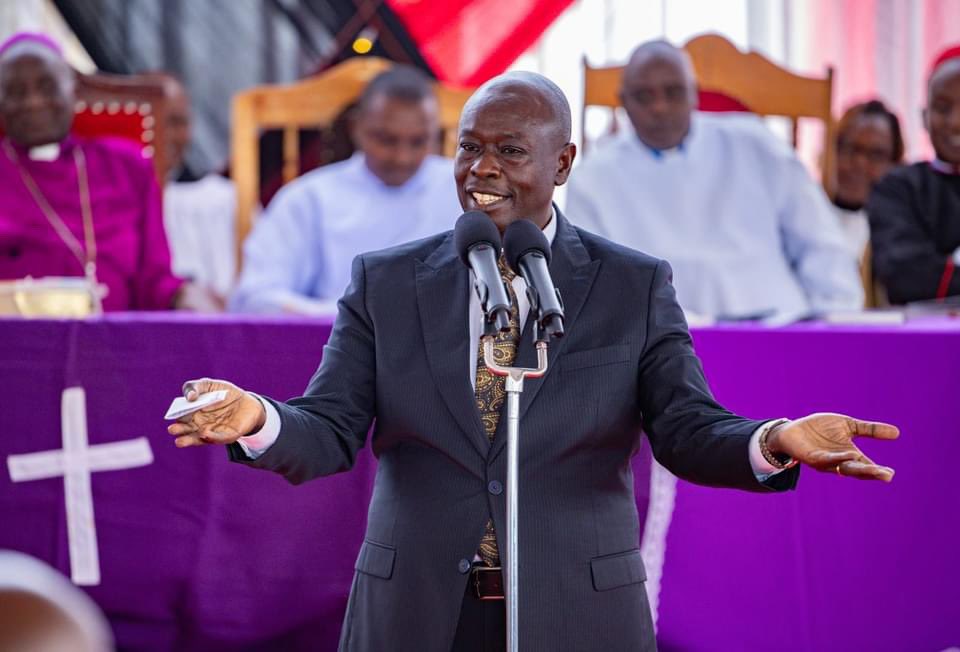“THE GACHAGUA SAGA: FEAR, LOATHING, AND UNMARKED CARS”
BY THE DISPATCH DIGITAL REPORTER
Former Kenyan Deputy President Rigathi Gachagua, often dubbed “Riggy G,” has ignited a political firestorm with allegations of intimidation, surveillance, and a looming threat to his life. In a dramatic social media post shared on November 20, the embattled leader painted a chilling picture of a government out to silence him, likening the tactics to the dark days of the Moi regime, which he once served as a District Officer.
“They’re Watching Me”
Gachagua, ousted just weeks ago in a swift and contentious impeachment, claims shadowy agents in unmarked vehicles have been stalking him. According to his revelations, these covert operatives have been stationed outside his Nairobi home, meticulously logging his visitors and tailing him wherever he goes.
“Security agents in unmarked cars have been following me wherever I go. They are parked at the entrance of my residence, taking note of all my visitors. They even trail me to my rural home in Nyeri,” his post read, with the urgency of a man who believes his days might be numbered.
In one incident on November 17, Gachagua recounted spotting a suspicious saloon car that trailed him through multiple stops, including a church service at PCEA Kerarapon and a late lunch, before returning to his residence. Running the vehicle’s plates only deepened his suspicions: it was registered as a lorry.
“Special Branch Tactics”
Not one to mince words, Gachagua drew a stark parallel between his ordeal and the reign of fear during former President Daniel arap Moi’s 24-year rule, marked by the dreaded “Special Branch” security unit.
“This surveillance and intimidation of Kenyans was last witnessed during Moi’s misrule!” he exclaimed, adding that such acts are a chilling reminder of a bygone era when dissenters vanished without a trace.
His allegations come at a time when Kenya is grappling with disturbing reports of forced disappearances, extrajudicial killings, and abductions by alleged state agents. For Gachagua, going public with his claims is not just a cry for help but a preemptive move to ensure accountability.
“In this era of extrajudicial killings and disappearances, I want Kenyans to know what I am going through and hold the state responsible if I am harmed,” he wrote. “I request the state to leave me alone! You hounded me out of office; now let me enjoy peace as a private citizen.”
-
Sale!

CURING HYPERTENSION: Simple Healing Secrets Revealed
Original price was: $20.00.$7.00Current price is: $7.00. Add to basket -
Sale!

Diabetes Reversal: Stop Medication and Live Worry-Free For Life
Original price was: $20.00.$5.00Current price is: $5.00. Add to basket -
Sale!

The Rise of the Silent
Original price was: $7.00.$3.00Current price is: $3.00. Add to basket -
Sale!

Win Back Your Financial Freedom: A Guide to Build Your Wealth
Original price was: $7.00.$3.00Current price is: $3.00. Add to basket
Poison Plots and Political Vendettas
This is not the first time the former Deputy President has raised alarms over his safety. In a previous address on October 20, during the turbulent days of his impeachment saga, Gachagua alleged he survived two poisoning attempts, one in Nyeri and another in Kisumu.
“I was taken ill during the impeachment proceedings and later discharged from hospital,” he recounted, implying the timing was anything but coincidental.
The former deputy president’s security detail was reportedly withdrawn temporarily during this period, leaving him vulnerable and fuelling fears of targeted elimination.
DCI’s Summons: A Tug of War
Following his public accusations, the Directorate of Criminal Investigations (DCI) summoned Gachagua to record a formal statement. The gravity of his claims—essentially accusing President William Ruto’s administration of orchestrating a campaign of intimidation—demanded an official inquiry.
But Gachagua, defiant as ever, refused to comply. Instead, he attended court proceedings at Milimani Law Courts to contest his impeachment, brushing aside the summons as part of the very harassment he has been decrying.
A Bitter Fallout
Gachagua’s fall from grace has been nothing short of spectacular. Once a stalwart of the Ruto administration, his impeachment has seen him transform into one of its most vocal critics. At rallies and public events, he spares no opportunity to lambast his former boss, accusing the government of betrayal and authoritarian tendencies.
Political observers say the fallout between Gachagua and Ruto, once hailed as an inseparable duo, is symptomatic of a broader struggle for power and influence within Kenya’s ruling elite.
The Public Reacts
Kenyans have responded to Gachagua’s claims with a mix of sympathy, scepticism, and outright disbelief. Social media platforms are abuzz with opinions, with some rallying to his defence and others dismissing his statements as theatrics.
“Why didn’t he speak out when he was in power? Now he wants us to feel sorry for him?” one Twitter user posted, echoing a sentiment shared by many.
Others, however, see Gachagua’s plight as emblematic of a dangerous trend. “Whether you like him or not, no one deserves to live in fear of their life. This isn’t just about Rigathi; it’s about all of us,” another commented.
What’s Next?
As Gachagua’s saga unfolds, it leaves behind a trail of unanswered questions:
- Are his allegations credible, or are they an attempt to regain political relevance?
- If true, what does this say about the state of democracy and human rights in Kenya?
- And perhaps most importantly, who stands to gain from Gachagua’s silence—or demise?
In a nation where political intrigue often outpaces even the wildest soap operas, one thing is certain: this is a story far from over.
Stay tuned as THE DISPATCH DIGITAL keeps its spotlight firmly fixed on this Kenyan drama. Will Riggy G’s fight for survival expose deeper truths about power and paranoia in Nairobi’s corridors of power? Only time will tell.
-
Sale!

CURING HYPERTENSION: Simple Healing Secrets Revealed
Original price was: $20.00.$7.00Current price is: $7.00. Add to basket -
Sale!

Diabetes Reversal: Stop Medication and Live Worry-Free For Life
Original price was: $20.00.$5.00Current price is: $5.00. Add to basket -
Sale!

The Rise of the Silent
Original price was: $7.00.$3.00Current price is: $3.00. Add to basket -
Sale!

Win Back Your Financial Freedom: A Guide to Build Your Wealth
Original price was: $7.00.$3.00Current price is: $3.00. Add to basket




